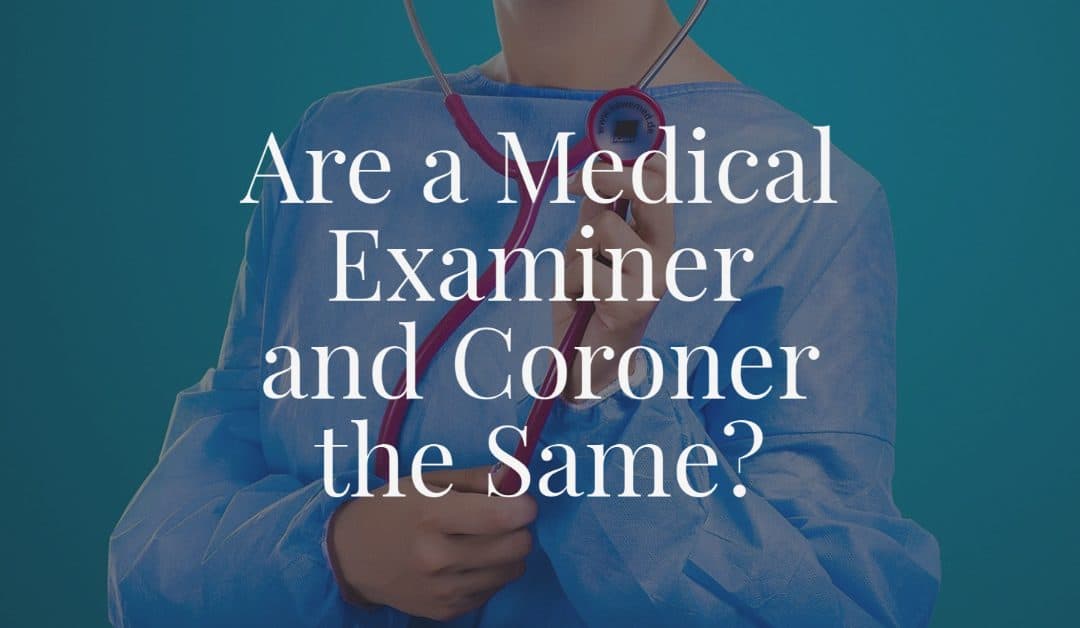Medical Examiners and coroners investigate deaths in mysterious circumstances such as suicide, homicide, or dying alone. In the cases they look at, it is undetermined why or how someone died. But are a medical examiner and a coroner the same?
Let’s look at the differences between the medical professionals who perform autopsies.
What Is An Autopsy?
An autopsy is also called a post-mortem examination or necropsy. A professional coroner or medical examiner studies the body of someone who died to determine the cause of death. Sometimes, an autopsy is an examination of only a particular area of the body.
Who Performs an Autopsy?
Depending on the policies where someone lives, there are different reasons a body may need an autopsy. There are also significant differences in how a coroner or medical examiner performs an autopsy.
Medical Examiners & Pathologists
A medical examiner is a physician trained in medicine. They are board-certified in a medical specialty. A medical examiner is frequently a pathologist who has spent many years preparing and learning how the human body succumbs to illness and death.
Coroners
A coroner is an elected official who may or may not have medical training. They conduct investigations at the county level to find out why and how someone died.
Depending on where someone lives, they could expect a medical examiner or a coroner.
Who Orders an Autopsy
When the state needs to rule a death an accident, a disease, or a crime, it employs professionals to find the answers. An autopsy is ordered by authorities even without relatives’ consent if there are extenuating circumstances such as:
- Homicide
- Suicide
- Death without having the care of a physician
When someone dies suspiciously, such as suicide or homicide, the medical examiner or coroner may order an autopsy. Different types of autopsies require different kinds of medical professionals to understand the cause of death. When the reasons for death are clear-cut, the state may only need a coroner to sign off before burial.
Medical Professionals & Coroners
Most counties in North Carolina have a medical examiner, but some counties still elect coroners. Coroners who need additional help identifying the cause of death or looking at forensic evidence can find the support they need.
The North Carolina Medical Examiner System is a network of doctors and health professionals who voluntarily devote their medical expertise to investigate suspicious, unusual, or unnatural deaths. They investigate all deaths in North Carolina due to injury, violence, and natural deaths that are suspicious, unusual, or unattended by medical professionals.
Types of Autopsies
These are the types of autopsies performed in North Carolina:
Forensic
This type of autopsy may collect necessary evidence for a criminal case. Evidence could include fibers left on the body, bullets, pictures of injured areas, etc.
Clinical
In this type of autopsy, a medical examiner who is also a pathologist studies the body. They give a medical assessment about the cause of death. A pathologist is a physician who studies body fluids and tissues. They also use laboratory tests when needed to determine the cause of death.
Someone who has died can also have a clinical assessment at the hospital before being released to the funeral home. A doctor who cared for the patient signs off on the cause of death.
Scientific
If you give your body to a University for study, they can also perform an autopsy for learning purposes. Perhaps they are studying the pathways of arterial plaque in veins and what might be the cause. There are many ways medical students and researchers can learn about the human body and the course of disease or injury and how it may affect those of us still alive.
How Do I Order an Autopsy?
When someone needs an autopsy, North Carolina has laws in place to determine the type of autopsy needed. The North Carolina Office of Chief Medical Examiner may not mandate an autopsy for an unattended death, or perform an autopsy upon the family’s request. Sometimes, a hospital may not agree to an autopsy after death, even if the family desires one. The hospital can refuse an autopsy if they believe their physician’s findings are sufficient.
If a coroner or medical examiner does not require an autopsy, then the deceased person’s next of kin can permit an autopsy. You can find private autopsy services if a loved one needs an autopsy.
Find Help
If you have any questions about the process of an autopsy, you can contact us at Renaissance Funeral Home. If you have any questions about the process or how long you can expect it to take, we have answers. We are here to help you and work with any office that is requesting or performing an autopsy. We understand the autopsy process and work with medical professionals to collect your loved one’s remains after an autopsy.


